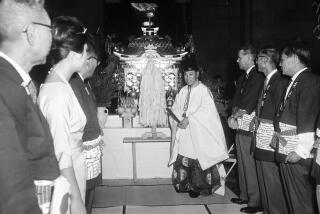Federal judge upholds ‘comfort women’ statue in Glendale park
- Share via
A federal judge has dismissed a lawsuit filed against Glendale that sought the removal of a controversial statue installed in a city park to honor women coerced into sexual slavery by the Japanese Imperial Army during World War II.
The statue’s opponents were unable to show that the 1,100-pound memorial caused them harm, and Glendale didn’t break any laws by erecting it in Central Park in July 2013, according to a court order signed last week by U.S. District Court Judge Percy Anderson.
The opponents — Michiko Gingery, a Glendale resident; GAHT-US Corp., an organization that works to block recognition of the former sex slaves, also known as “comfort women”; and Koichi Mera, a Los Angeles resident — claimed in court records that by installing the statue, Glendale infringed upon the federal government’s exclusive power to conduct foreign affairs, violated the Supremacy Clause of the Constitution and caused opponents to avoid Central Park because the statue made them feel excluded and angry.
“The fact that local residents feel disinclined to visit a local park is simply not the type of injury that can be considered to be in the ‘line of causation’ for alleged violations of the foreign affairs power and Supremacy Clause,” Anderson said in court documents.
The decision comes after more than a year of unsuccessful attempts to block, then to remove, the bronze memorial of a girl in Korean dress sitting next to an empty chair. In addition to the lawsuit, multiple delegations of conservative Japanese politicians have traveled to Glendale to ask the City Council to get rid of the monument.
At the same time, supporters who visit the statue leave behind bouquets and gifts.
“We are pleased that the court recognized our City Council’s right to make public pronouncements on matters important to our community,” said City Atty. Mike Garcia.
William Benjamin DeClercq, an attorney for those who filed the lawsuit, declined to comment on the decision.
The Glendale statue, supported by the Korea-Glendale Sister City Assn. and the Korean American Forum of California, is just one example of a large-scale effort to raise international awareness of the comfort women’s plight.
For years, surviving comfort women have been calling on the Japanese parliament, known as the Diet, to draft a resolution apologizing for the mistreatment of an estimated 80,000 to 200,000 women from Korea, China and other countries.
But the awareness campaign has angered Japanese nationals who deny that their country was involved in a system of sexual slavery, despite a personal apology to former comfort women from an ex-prime minister and an admission by the Japanese Ministry of Foreign Affairs that some women working in brothels overseen by the government were deprived of their freedom.
Phyllis Kim, spokeswoman for the Korean American Forum of California, said her organization’s members are happy with the decision, but they plan to continue to work with local, state and federal governments to honor former comfort women.
“The decision did not change anything. The root cause of the issue has not been resolved, and the victims are still waiting for an official apology and reparations from the government of Japan,” Kim said.
Twitter: @brittanylevine
More to Read
Sign up for Essential California
The most important California stories and recommendations in your inbox every morning.
You may occasionally receive promotional content from the Los Angeles Times.










